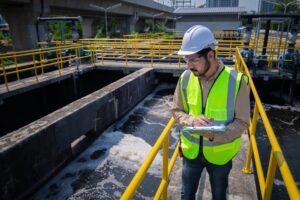The EPA recently announced Starbound, LLC, a subsidiary of Aleutian Spray Fisheries, Inc., in Seattle, Washington, reached a consent agreement with the Agency that includes penalties of $168,000 for alleged Clean Water Act (CWA) violations at operations off the coasts of Oregon, Washington, and Alaska.
CWA NPDES permit regulations
The CWA prohibits the “discharge of pollutants” by any “person” from any “point source” into “waters of the United States (WOTUS)” except, inter alia, as authorized by a National Pollutant Discharge Elimination System (NPDES) permit issued pursuant to CWA regulations. Inter alia is a Latin legal phrase that means “among other things,” so the term covers just about anything discharged into WOTUS.
The CWA also provides the EPA with regulatory authority to issue permits under the NPDES program for the discharge of pollutants from point sources to navigable waters, although in some cases, states have received authority from the EPA to administer NPDES permits within the states’ borders. In Starbound’s case, the EPA directly administers the NPDES permitting program authorizing the discharge of seafood processing wastes and other designated wastewaters in federal waters off the coasts of Washington, Oregon, and Alaska.
Background
Starbound received an NPDES Authorization to Discharge permit for Offshore Seafood Processors Discharging in Federal Waters Off the Coast of Washington and Oregon. That permit became effective on May 1, 2019, and provided terms and conditions for the discharge of seafood processing wastes and other designated wastewaters.
Starbound (the “facility”) received its Alaska NPDES permit to discharge seafood processing wastes and other designated wastewaters on December 1, 2009.
“Off the coast of Alaska, the Facility caught and processed pollock and pacific cod,” the consent agreement states. “The Facility had a meal plant onboard to capture and process fish residue (e.g., skin, bones, and heads). The waste was typically cooked and dried prior to grinding. As part of the cooking process, the Facility generated and discharged gelatinous waste, known as stickwater. In total, the Facility had 15 discharge points, with 6 of those discharge points accompanied by grinder pumps that are designed to grind seafood waste to 0.5 inches or less.
“The Facility discharged wastewater, including seafood processing waste, that contained ‘pollutants’ … [into WOTUS] … Respondent submitted a Notice of Intent (NOI) for coverage under the Washington and Oregon Permit on April 24, 2019. Respondent submitted a NOI for coverage under the Alaska Permit on January 22, 2010; on August 29, 2014; and on October 16, 2019.”
Stickwater is gelatinous waste that contains organic components that consume a lot of oxygen as part of the decomposition process, which can result in reduced oxygen levels in the seawaters at the ocean bottom. Low oxygen conditions create “dead zones” because most marine life either dies or leaves the area. Low oxygen conditions already exist along the Washington and Oregon coasts, according to the EPA.
“The National Pollutant Discharge Elimination System permits required for Starbound and other seafood processing vessels contain limits on what companies can discharge, monitoring and reporting requirements and other provisions to ensure that discharges do not harm water quality or the environment,” an Agency news release says. “Between 2020 and 2023, EPA completed reviews of annual reports for [Starbound’s] offshore seafood processing permits and found a significant number of violations with permit requirements.”
Violations
The EPA documented 14 alleged violations against Starbound.
Washington and Oregon alleged permit violations:
- Exceeded their discharge allowance on their Washington and Oregon permit twice in 2020
- Failure to update NOI to reflect material change
- Failure to conduct a preoperational check of outfall system
- Failure to take required pictures
- Failure to take and analyze wastewater and stickwater samples
- Failure to submit timely quarterly discharge monitoring reports
- Failure to timely submit annual reports
- Failure to include noncompliance report in annual reports
- Failure to include production and discharge information in annual reports
- Failure to report location data
- Failure to report daily distance data
Alaska alleged permit violations:
- Failure to timely submit annual reports
- Failure to take representative picture
- Failure to report stickwater discharge
See the Starbound Consent Agreement for additional details regarding alleged violations.
Takeaway
“Companies that don’t accurately report discharge make it difficult for them and EPA to evaluate the potential impacts posed by the seafood processing vessels,” said EPA Region 10 Office of Enforcement and Compliance Assurance Director Ed Kowalski in the Agency release. “Compliance with EPA’s permit for offshore discharges is imperative to protecting our sensitive coastal waters, and disregard for the [CWA] will result in a hefty fine.”

